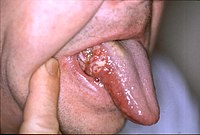
Photo from wikipedia
Cervical cancers are almost always induced by HPV infections, of which HPV16 and HPV18 are predominant. Cancers associated with these strains are induced through DNA repair factors and have a… Click to show full abstract
Cervical cancers are almost always induced by HPV infections, of which HPV16 and HPV18 are predominant. Cancers associated with these strains are induced through DNA repair factors and have a differential response to radiation therapy. Hence this study focuses on finding DNA repair gene expression differences in HPV16 and HPV18 positive cervical cancers after radiation therapy. A higher number of somatic mutations were observed in HPV16 positive cervical tumours for patients that were disease free when compared to those who recurred/progressed. Moreover, hierarchal clustering of RNAseq data from The Cancer Genome Atlas was conducted to identify groups of DNA repair genes associated with a differential prognosis for cervical cancer following postoperative radiation therapy. TP53BP1, MCM9 (at higher than mean levels), POLR2F and SIRT6 (at lower than mean levels), were associated with an increase in patients experiencing cervical cancer recurrence/progression following postoperative radiation therapy when HPV18 positive, but not HPV16 positive. The expression patterns of these genes provide an explanation for the higher rate of postoperative radiation therapy resistance associated with HPV18 positive cervical cancer patients. Therefore, HPV18 positive cervical tumours may be more likely retain a greater non-homologous end joining and homologous recombination pathway activity, which could dampen the effect of postoperative radiation therapy. Moreover, greater susceptibility to postoperative radiation therapy could be caused by the reliance of cervical cancer cells upon the single-strand annealing and nucleotide excision pathways for repair of DNA damage.
Journal Title: Scientific Reports
Year Published: 2020
Link to full text (if available)
Share on Social Media: Sign Up to like & get
recommendations!